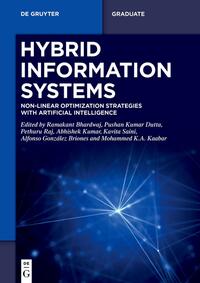
The book provides comprehensive and cognitive approach to building and deploying sophisticated information systems. The book utilizes non-linear optimization techniques, fuzzy logic, and rough sets to model various real-world use cases for the digital era. The hybrid information system modeling handles both qualitative and quantitative data and can effectively handle uncertainty and imprecision in the data. The combination of non-linear optimization mechanisms, fuzzy logic, and rough sets provides a robust foundation for next-generation information systems that can fulfill the demands of adaptive, aware, and adroit software applications for the knowledge era. The book emphasizes the importance of the hybrid approach, which combines the strengths of both mathematical and AI techniques, to achieve a more comprehensive and effective modeling process. Hybrid information system modeling techniques combine different approaches, such as fuzzy logic, rough sets, and neural networks, to create models that can handle the complexity and uncertainty of real-world problems. These techniques provide a powerful tool for modeling and analyzing complex systems, and the applications of hybrid information system modeling demonstrate their potential for solving real-world problems in various fields.